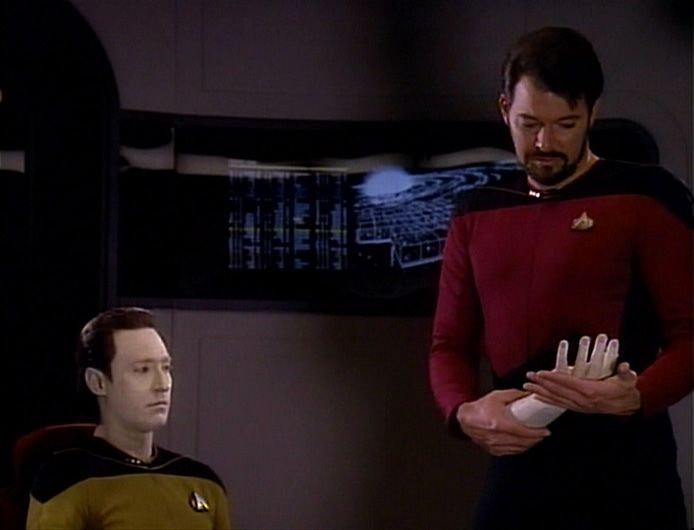Memory Alpha summary
 |
| via Planet Shannon "Alas, poor Data!" "Commander, I am right here." "...A fellow of infinite jest and bad whistling..." |
Some nutty Starfleet specialist wants to construct a whole line of androids, using Data as template. In order to do so, he would have to disassemble Data. As far as Starfleet is concerned, this is a done deal. Picard chooses to challenge. It is in many ways the beginning of the relationship that blossoms in the later films. (It's also the first time the crew plays poker, which would become a series staple.)
Some of the concepts are later echoed in Deep Space Nine (Odo's early existence meaning coming up against those who don't understand what he is, as referenced in "The Alternate" and :The Begotten") and Voyager (The Doctor comes across legal arbiters with different conclusions in "Author, Author"), and if you want to get technical about it, Enterprise (Trip's clone in "Similitude").
And while it is undeniably important for Data and a strong moral argument against slavery (which even Picard doesn't think about until he talks the matter over with Guinan in arguably her first truly significant moment), "Measure" may in fact best be considered Picard's finest moment to that point in the series, providing Patrick Stewart with the best material he'd had as the good captain, something that makes him passionate for the first time as he argues for Data's existence and all the implications therein. Court drama has surprisingly been a reliable trope in the franchise, but never better than in "Measure."
Which also means, for second episode in a row, Riker gets to shine. Increasingly, he emerges as a character best defined by the experiences he wish he didn't have, not because they're physically traumatic, but emotionally. There's a version of Riker who is probably locked up in his quarters with PTSD from all the times he had to confront situations like making such a fine argument against Data that even Picard wonders if it can be countered. The fact that Riker is forced into this particular nightmare is somewhat tossed into the episode, but by the time it plays out, it's a terrific example of how tight-knit the crew really is.
It should be noted that Starfleet doesn't uniformly conclude the matter in a feel-good way. Admiral Dougherty in Insurrection seems to think of Data as no more than an android that needs to be deactivated because it has caused too many problems. I don't think this or the later Voyager episode referenced above devalues "Measure" in the slightest, but rather helps add to the realism of the story and the richness of the franchise. The series continues to reference "Measure," too, and Starfleet never does seem to learn. I think that's something we can relate to here in the early 21st century, alas...But an episode like this one reminds us that sometimes we do manage to get it right.
One final note: it's interesting and perhaps telling that Dr. Pulaski is nearly a complete non-factor in the proceedings, despite the fact that she's the character introduced during the season who's the first to question how exactly to approach Data's status as a sentient being. The writing is on the wall, as it were, that she will ultimately be swept into general insignificance in the grand scheme of the series, as of this episode.
four quarter analysis
franchise * series * essential * character
notable guest-stars:
Whoopi Goldberg
Colm Meaney
Diana Muldaur

No comments:
Post a Comment